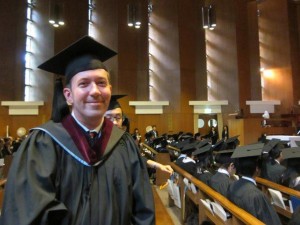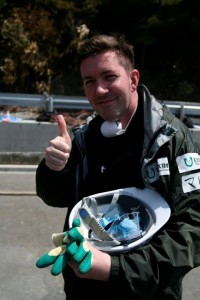Life After JET: Return to Japan? You can, and I did, as a Rotary International Peace Fellow
As a JET alum, have you ever thought about returning to Japan in a different capacity? Are you interested in earning a fully-funded MA in Peace Studies in Tokyo? You can, and I did, as a Rotary International Peace Fellow. (In fact, there have been at least five JET alums who have gone on to be Rotary Peace Fellows) For me, it was a perfect chance to return to Japan and advance my career at the same time.
Like many JET alums, I’d always thought it would be nice to live in Japan once again, but was not as interested in taking the Eikaiwa route. I had a wonderful experience as an ALT in Nagasaki (2000-04) and truly treasured my time there. After my time on JET, I had returned to the States and was living and working for the US Govt in Washington, DC through the Presidential Management Fellows (PMF) Program. Still, I missed the experience of daily life in another culture and was looking for a way to make it happen. Through a friend of mine named William Daniel Sturgeon, who is also a JET alum and a former Peace Fellow, I learned about this great opportunity. Thanks to his great advice and mentoring, I was able to complete the application and selection process successfully and become a Rotary International Peace Fellow in Japan in 2010.
Through the Rotary Fellowship, I was able to spend two years of fully-funded study at the International Christian University (ICU) in Tokyo, which is regarded as one of the best liberal arts schools in Asia. As one of six global partners, ICU awards a two-year MA in Peace Studies to Rotary Peace Fellows who complete all program requirements. I was also able to study the Japanese language at ICU and, through Rotary, complete a two-month summer internship with the UN in Geneva as part of my Thesis research. Through an academic exchange program, I was also able to intern at the United Nations University (UNU) in Tokyo. And although I never could have imagined it would happen, I was also there in Japan during the time of the terrible 3/11 Earthquake and Tsunami, and in fact was able to volunteer on a relief mission in Ishinomaki as a result.
I graduated in June of 2012 and moved to New York City, where I have been living and working at The Japan ICU Foundation (JICUF) ever since. I have really enjoyed getting to know the various members of the JETAANY and Rotary International communities here in the area, as well as discovering related organizations like the Japan Society, Japan Foundation, Weatherhead Institute at Columbia University and others. The Rotary Peace Fellowship has been a great connection between my previous Japan experience on JET and my present work with JICUF here in New York. Speaking of connections, the current Rotary International President for 2012-13 is Mr. Sakuji Tanaka, a lifelong Rotarian and very successful businessman from Yashio, Japan. President Tanaka’s theme for his term is “Peace Through Service”, upon which he has elaborated that “Peace is not something that can only be achieved through treaties, by governments, or through heroic struggles…it is something that we can find and that we can achieve, every day and in many simple ways.” I feel this is a perfect summary of how I was able to find out about and participate in this great Rotary Peace Fellowship, and how many more JET alums can and should apply as well!
How to become a Rotary Peace Fellow
Successful finalists for the Rotary Peace Fellowship select their preferences from a number of partnering Universities, of which ICU is the only one in Japan. While Peace Fellows cannot “choose” ICU directly, history has shown that those who select ICU (especially JET alums) tend to be invited there for their degree programs. Once tentatively accepted as new Peace Fellows, they will then apply directly to the graduate school for matriculation.
Like the JET Program application, the Rotary Peace Fellowship takes a certain degree of dedicated time and effort. The application process starts in early January, with nominations coming through local Rotary Clubs. Interested candidates should contact their local Rotary Club ASAP for further information, as the Clubs must interview and decide to nominate potential Peace Fellows initially. New applicants for this cycle, if successful, would expect to start their studies at ICU in mid-summer 2014.
Eligibility criteria (most of which is also related to the JET experience):
- A strong commitment to international understanding and peace demonstrated through professional and academic achievements and personal and community service activities
- A bachelor’s degree or commensurate experience as a minimum, with strong academic achievement
- A minimum of three years’ combined paid or unpaid full-time relevant work experience
- Proficiency in a second language
- Strong leadership skills
For the benefit of interested JET Alums, we will be following this Blog with a series of short Q&A interviews with former JETs who have also been Rotary Peace Fellows at ICU. Through these profiles, we hope to provide a broad example of JET alums who have successfully returned to Japan, completed the Rotary Peace Fellowship and added value to their professional careers and personal lives in the process.





Comments are closed.